Investigating Wells Fargo's Fake Account Scandal: A Research Proposal
VerifiedAdded on 2020/04/21
|21
|4020
|151
Report
AI Summary
This research proposal investigates the Wells Fargo fake account scandal, focusing on corporate social responsibility, ethics, and human rights. It examines the scandal's impact, ethical violations, and the role of corporate constitutionalism, corporate citizenship, normative stakeholder theory, and universal human rights theory. The proposal outlines the research aim, objectives, and questions, along with a literature review exploring relevant theories and concepts. The methodology includes research philosophy, approach, design, data collection, and analysis. The study aims to identify the ethical issues, assess the impact of the scandal, and recommend measures to prevent future occurrences, contributing to a deeper understanding of ethical challenges in the banking industry and the importance of CSR.
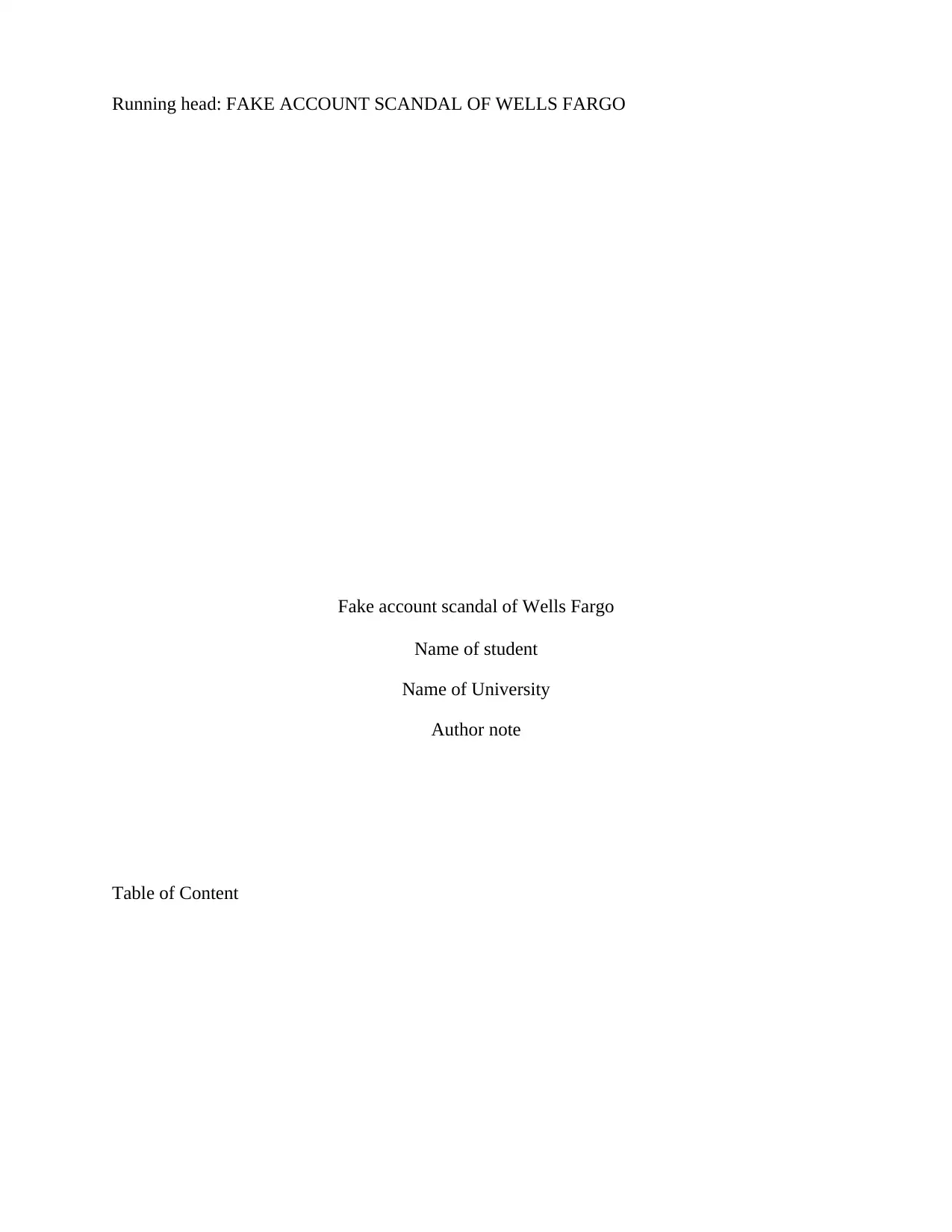
Running head: FAKE ACCOUNT SCANDAL OF WELLS FARGO
Fake account scandal of Wells Fargo
Name of student
Name of University
Author note
Table of Content
Fake account scandal of Wells Fargo
Name of student
Name of University
Author note
Table of Content
Paraphrase This Document
Need a fresh take? Get an instant paraphrase of this document with our AI Paraphraser
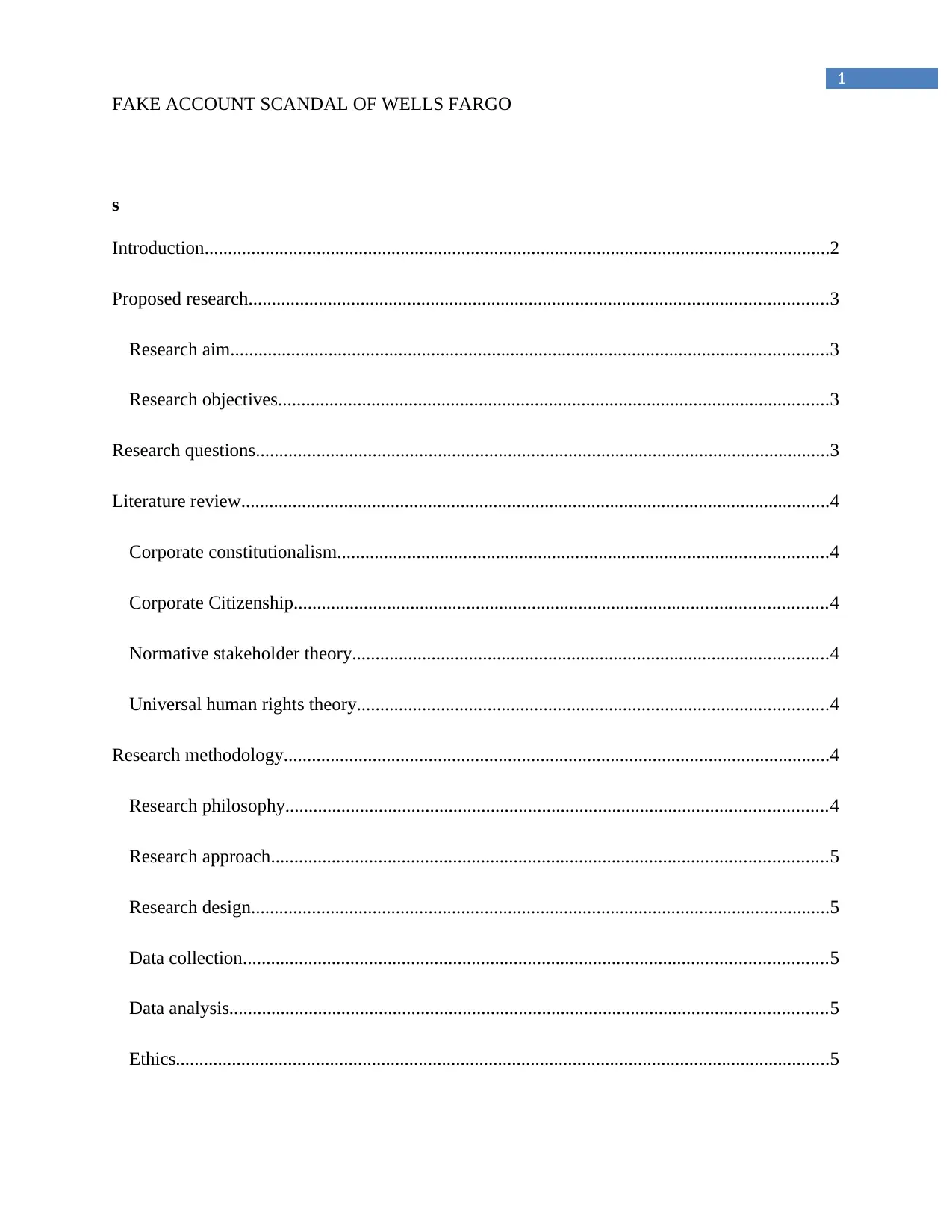
1
FAKE ACCOUNT SCANDAL OF WELLS FARGO
s
Introduction......................................................................................................................................2
Proposed research............................................................................................................................3
Research aim................................................................................................................................3
Research objectives......................................................................................................................3
Research questions...........................................................................................................................3
Literature review..............................................................................................................................4
Corporate constitutionalism.........................................................................................................4
Corporate Citizenship..................................................................................................................4
Normative stakeholder theory......................................................................................................4
Universal human rights theory.....................................................................................................4
Research methodology.....................................................................................................................4
Research philosophy....................................................................................................................4
Research approach.......................................................................................................................5
Research design............................................................................................................................5
Data collection.............................................................................................................................5
Data analysis................................................................................................................................5
Ethics............................................................................................................................................5
FAKE ACCOUNT SCANDAL OF WELLS FARGO
s
Introduction......................................................................................................................................2
Proposed research............................................................................................................................3
Research aim................................................................................................................................3
Research objectives......................................................................................................................3
Research questions...........................................................................................................................3
Literature review..............................................................................................................................4
Corporate constitutionalism.........................................................................................................4
Corporate Citizenship..................................................................................................................4
Normative stakeholder theory......................................................................................................4
Universal human rights theory.....................................................................................................4
Research methodology.....................................................................................................................4
Research philosophy....................................................................................................................4
Research approach.......................................................................................................................5
Research design............................................................................................................................5
Data collection.............................................................................................................................5
Data analysis................................................................................................................................5
Ethics............................................................................................................................................5
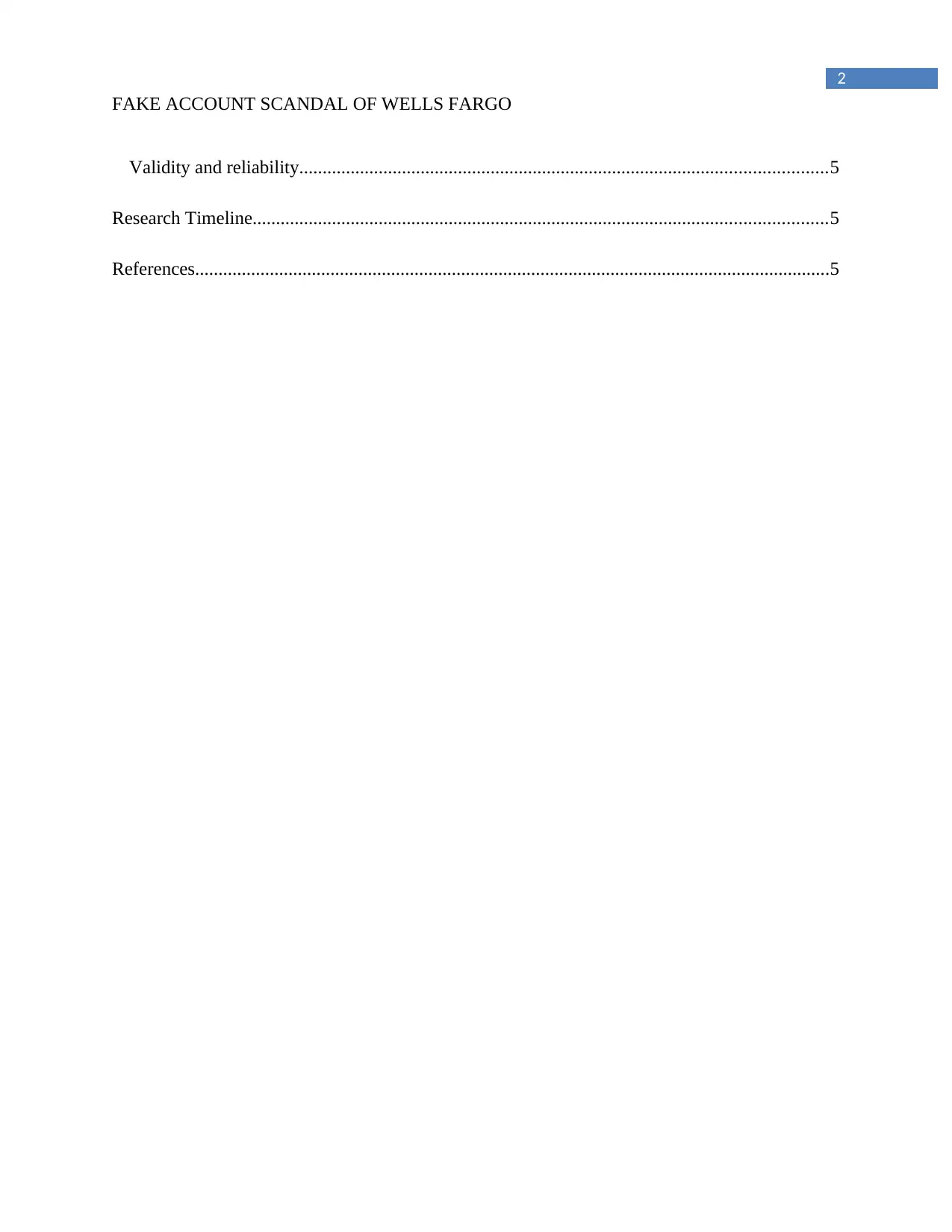
2
FAKE ACCOUNT SCANDAL OF WELLS FARGO
Validity and reliability.................................................................................................................5
Research Timeline...........................................................................................................................5
References........................................................................................................................................5
FAKE ACCOUNT SCANDAL OF WELLS FARGO
Validity and reliability.................................................................................................................5
Research Timeline...........................................................................................................................5
References........................................................................................................................................5
⊘ This is a preview!⊘
Do you want full access?
Subscribe today to unlock all pages.

Trusted by 1+ million students worldwide
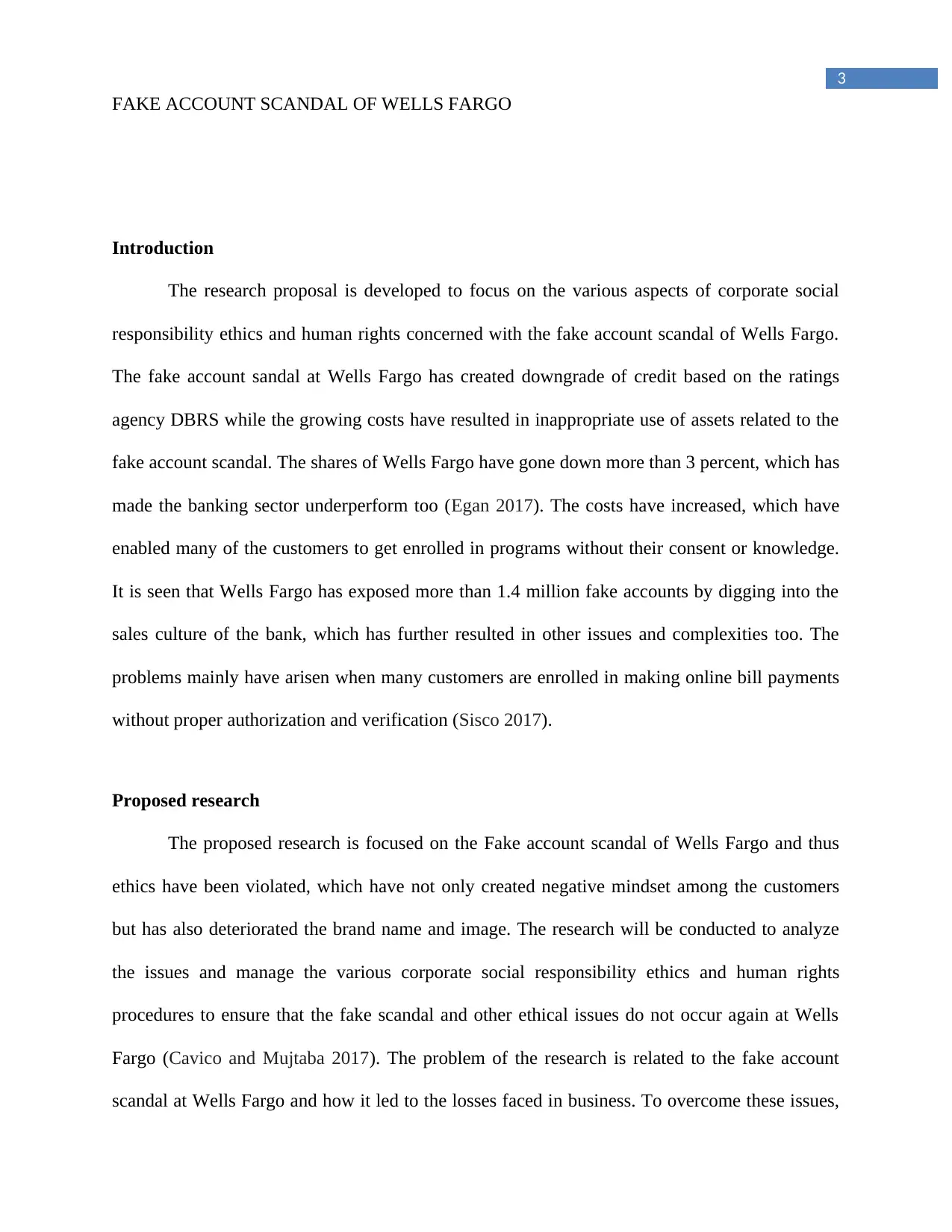
3
FAKE ACCOUNT SCANDAL OF WELLS FARGO
Introduction
The research proposal is developed to focus on the various aspects of corporate social
responsibility ethics and human rights concerned with the fake account scandal of Wells Fargo.
The fake account sandal at Wells Fargo has created downgrade of credit based on the ratings
agency DBRS while the growing costs have resulted in inappropriate use of assets related to the
fake account scandal. The shares of Wells Fargo have gone down more than 3 percent, which has
made the banking sector underperform too (Egan 2017). The costs have increased, which have
enabled many of the customers to get enrolled in programs without their consent or knowledge.
It is seen that Wells Fargo has exposed more than 1.4 million fake accounts by digging into the
sales culture of the bank, which has further resulted in other issues and complexities too. The
problems mainly have arisen when many customers are enrolled in making online bill payments
without proper authorization and verification (Sisco 2017).
Proposed research
The proposed research is focused on the Fake account scandal of Wells Fargo and thus
ethics have been violated, which have not only created negative mindset among the customers
but has also deteriorated the brand name and image. The research will be conducted to analyze
the issues and manage the various corporate social responsibility ethics and human rights
procedures to ensure that the fake scandal and other ethical issues do not occur again at Wells
Fargo (Cavico and Mujtaba 2017). The problem of the research is related to the fake account
scandal at Wells Fargo and how it led to the losses faced in business. To overcome these issues,
FAKE ACCOUNT SCANDAL OF WELLS FARGO
Introduction
The research proposal is developed to focus on the various aspects of corporate social
responsibility ethics and human rights concerned with the fake account scandal of Wells Fargo.
The fake account sandal at Wells Fargo has created downgrade of credit based on the ratings
agency DBRS while the growing costs have resulted in inappropriate use of assets related to the
fake account scandal. The shares of Wells Fargo have gone down more than 3 percent, which has
made the banking sector underperform too (Egan 2017). The costs have increased, which have
enabled many of the customers to get enrolled in programs without their consent or knowledge.
It is seen that Wells Fargo has exposed more than 1.4 million fake accounts by digging into the
sales culture of the bank, which has further resulted in other issues and complexities too. The
problems mainly have arisen when many customers are enrolled in making online bill payments
without proper authorization and verification (Sisco 2017).
Proposed research
The proposed research is focused on the Fake account scandal of Wells Fargo and thus
ethics have been violated, which have not only created negative mindset among the customers
but has also deteriorated the brand name and image. The research will be conducted to analyze
the issues and manage the various corporate social responsibility ethics and human rights
procedures to ensure that the fake scandal and other ethical issues do not occur again at Wells
Fargo (Cavico and Mujtaba 2017). The problem of the research is related to the fake account
scandal at Wells Fargo and how it led to the losses faced in business. To overcome these issues,
Paraphrase This Document
Need a fresh take? Get an instant paraphrase of this document with our AI Paraphraser
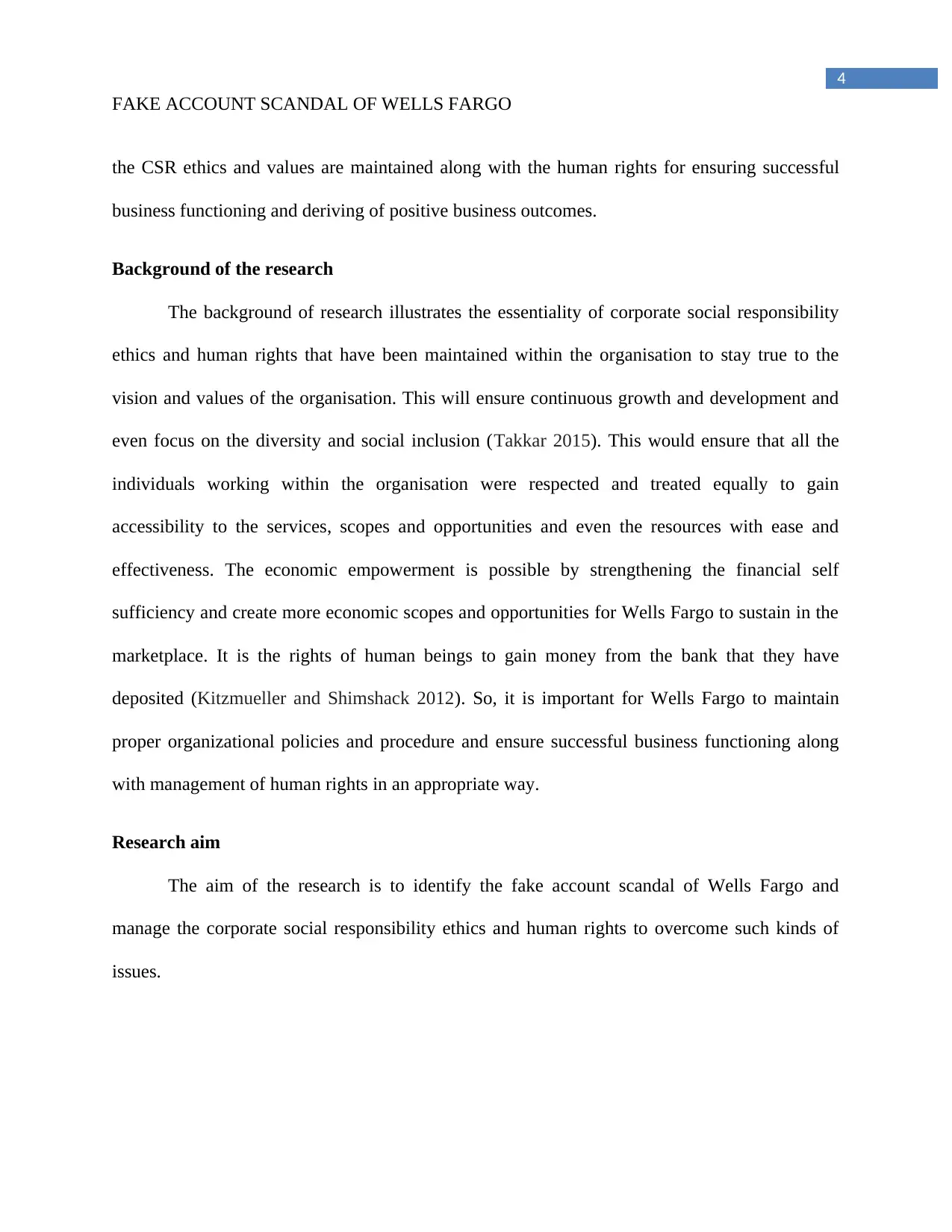
4
FAKE ACCOUNT SCANDAL OF WELLS FARGO
the CSR ethics and values are maintained along with the human rights for ensuring successful
business functioning and deriving of positive business outcomes.
Background of the research
The background of research illustrates the essentiality of corporate social responsibility
ethics and human rights that have been maintained within the organisation to stay true to the
vision and values of the organisation. This will ensure continuous growth and development and
even focus on the diversity and social inclusion (Takkar 2015). This would ensure that all the
individuals working within the organisation were respected and treated equally to gain
accessibility to the services, scopes and opportunities and even the resources with ease and
effectiveness. The economic empowerment is possible by strengthening the financial self
sufficiency and create more economic scopes and opportunities for Wells Fargo to sustain in the
marketplace. It is the rights of human beings to gain money from the bank that they have
deposited (Kitzmueller and Shimshack 2012). So, it is important for Wells Fargo to maintain
proper organizational policies and procedure and ensure successful business functioning along
with management of human rights in an appropriate way.
Research aim
The aim of the research is to identify the fake account scandal of Wells Fargo and
manage the corporate social responsibility ethics and human rights to overcome such kinds of
issues.
FAKE ACCOUNT SCANDAL OF WELLS FARGO
the CSR ethics and values are maintained along with the human rights for ensuring successful
business functioning and deriving of positive business outcomes.
Background of the research
The background of research illustrates the essentiality of corporate social responsibility
ethics and human rights that have been maintained within the organisation to stay true to the
vision and values of the organisation. This will ensure continuous growth and development and
even focus on the diversity and social inclusion (Takkar 2015). This would ensure that all the
individuals working within the organisation were respected and treated equally to gain
accessibility to the services, scopes and opportunities and even the resources with ease and
effectiveness. The economic empowerment is possible by strengthening the financial self
sufficiency and create more economic scopes and opportunities for Wells Fargo to sustain in the
marketplace. It is the rights of human beings to gain money from the bank that they have
deposited (Kitzmueller and Shimshack 2012). So, it is important for Wells Fargo to maintain
proper organizational policies and procedure and ensure successful business functioning along
with management of human rights in an appropriate way.
Research aim
The aim of the research is to identify the fake account scandal of Wells Fargo and
manage the corporate social responsibility ethics and human rights to overcome such kinds of
issues.
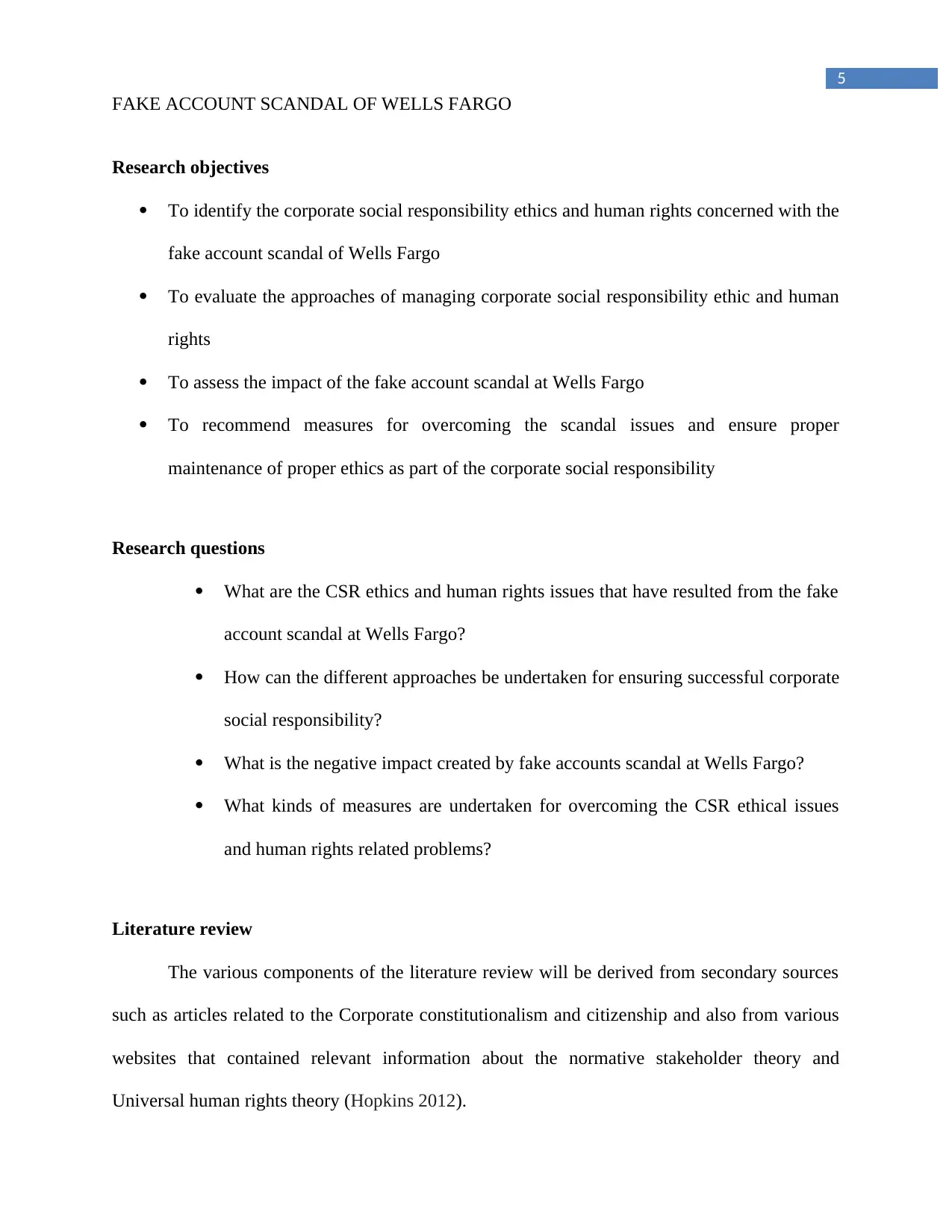
5
FAKE ACCOUNT SCANDAL OF WELLS FARGO
Research objectives
To identify the corporate social responsibility ethics and human rights concerned with the
fake account scandal of Wells Fargo
To evaluate the approaches of managing corporate social responsibility ethic and human
rights
To assess the impact of the fake account scandal at Wells Fargo
To recommend measures for overcoming the scandal issues and ensure proper
maintenance of proper ethics as part of the corporate social responsibility
Research questions
What are the CSR ethics and human rights issues that have resulted from the fake
account scandal at Wells Fargo?
How can the different approaches be undertaken for ensuring successful corporate
social responsibility?
What is the negative impact created by fake accounts scandal at Wells Fargo?
What kinds of measures are undertaken for overcoming the CSR ethical issues
and human rights related problems?
Literature review
The various components of the literature review will be derived from secondary sources
such as articles related to the Corporate constitutionalism and citizenship and also from various
websites that contained relevant information about the normative stakeholder theory and
Universal human rights theory (Hopkins 2012).
FAKE ACCOUNT SCANDAL OF WELLS FARGO
Research objectives
To identify the corporate social responsibility ethics and human rights concerned with the
fake account scandal of Wells Fargo
To evaluate the approaches of managing corporate social responsibility ethic and human
rights
To assess the impact of the fake account scandal at Wells Fargo
To recommend measures for overcoming the scandal issues and ensure proper
maintenance of proper ethics as part of the corporate social responsibility
Research questions
What are the CSR ethics and human rights issues that have resulted from the fake
account scandal at Wells Fargo?
How can the different approaches be undertaken for ensuring successful corporate
social responsibility?
What is the negative impact created by fake accounts scandal at Wells Fargo?
What kinds of measures are undertaken for overcoming the CSR ethical issues
and human rights related problems?
Literature review
The various components of the literature review will be derived from secondary sources
such as articles related to the Corporate constitutionalism and citizenship and also from various
websites that contained relevant information about the normative stakeholder theory and
Universal human rights theory (Hopkins 2012).
⊘ This is a preview!⊘
Do you want full access?
Subscribe today to unlock all pages.

Trusted by 1+ million students worldwide
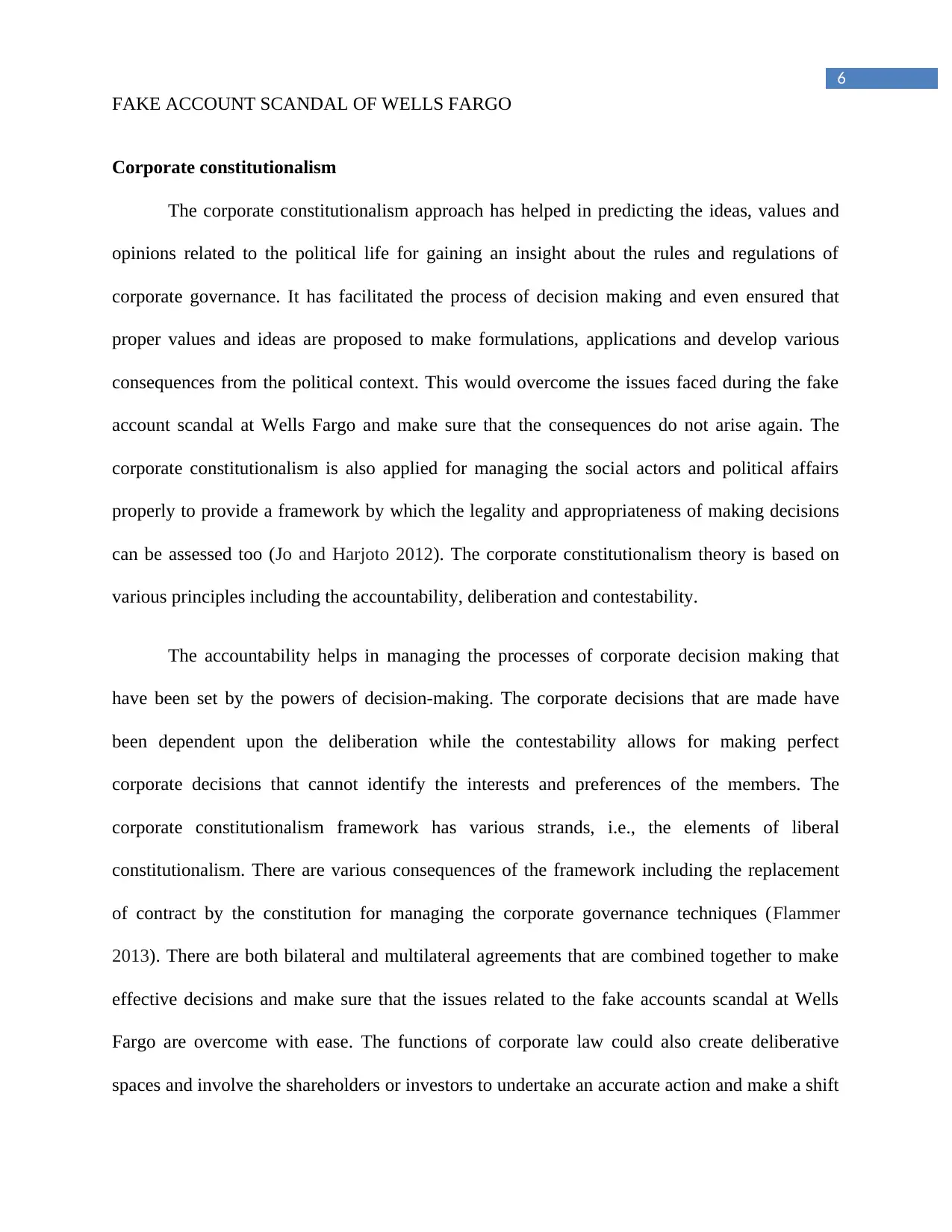
6
FAKE ACCOUNT SCANDAL OF WELLS FARGO
Corporate constitutionalism
The corporate constitutionalism approach has helped in predicting the ideas, values and
opinions related to the political life for gaining an insight about the rules and regulations of
corporate governance. It has facilitated the process of decision making and even ensured that
proper values and ideas are proposed to make formulations, applications and develop various
consequences from the political context. This would overcome the issues faced during the fake
account scandal at Wells Fargo and make sure that the consequences do not arise again. The
corporate constitutionalism is also applied for managing the social actors and political affairs
properly to provide a framework by which the legality and appropriateness of making decisions
can be assessed too (Jo and Harjoto 2012). The corporate constitutionalism theory is based on
various principles including the accountability, deliberation and contestability.
The accountability helps in managing the processes of corporate decision making that
have been set by the powers of decision-making. The corporate decisions that are made have
been dependent upon the deliberation while the contestability allows for making perfect
corporate decisions that cannot identify the interests and preferences of the members. The
corporate constitutionalism framework has various strands, i.e., the elements of liberal
constitutionalism. There are various consequences of the framework including the replacement
of contract by the constitution for managing the corporate governance techniques (Flammer
2013). There are both bilateral and multilateral agreements that are combined together to make
effective decisions and make sure that the issues related to the fake accounts scandal at Wells
Fargo are overcome with ease. The functions of corporate law could also create deliberative
spaces and involve the shareholders or investors to undertake an accurate action and make a shift
FAKE ACCOUNT SCANDAL OF WELLS FARGO
Corporate constitutionalism
The corporate constitutionalism approach has helped in predicting the ideas, values and
opinions related to the political life for gaining an insight about the rules and regulations of
corporate governance. It has facilitated the process of decision making and even ensured that
proper values and ideas are proposed to make formulations, applications and develop various
consequences from the political context. This would overcome the issues faced during the fake
account scandal at Wells Fargo and make sure that the consequences do not arise again. The
corporate constitutionalism is also applied for managing the social actors and political affairs
properly to provide a framework by which the legality and appropriateness of making decisions
can be assessed too (Jo and Harjoto 2012). The corporate constitutionalism theory is based on
various principles including the accountability, deliberation and contestability.
The accountability helps in managing the processes of corporate decision making that
have been set by the powers of decision-making. The corporate decisions that are made have
been dependent upon the deliberation while the contestability allows for making perfect
corporate decisions that cannot identify the interests and preferences of the members. The
corporate constitutionalism framework has various strands, i.e., the elements of liberal
constitutionalism. There are various consequences of the framework including the replacement
of contract by the constitution for managing the corporate governance techniques (Flammer
2013). There are both bilateral and multilateral agreements that are combined together to make
effective decisions and make sure that the issues related to the fake accounts scandal at Wells
Fargo are overcome with ease. The functions of corporate law could also create deliberative
spaces and involve the shareholders or investors to undertake an accurate action and make a shift
Paraphrase This Document
Need a fresh take? Get an instant paraphrase of this document with our AI Paraphraser
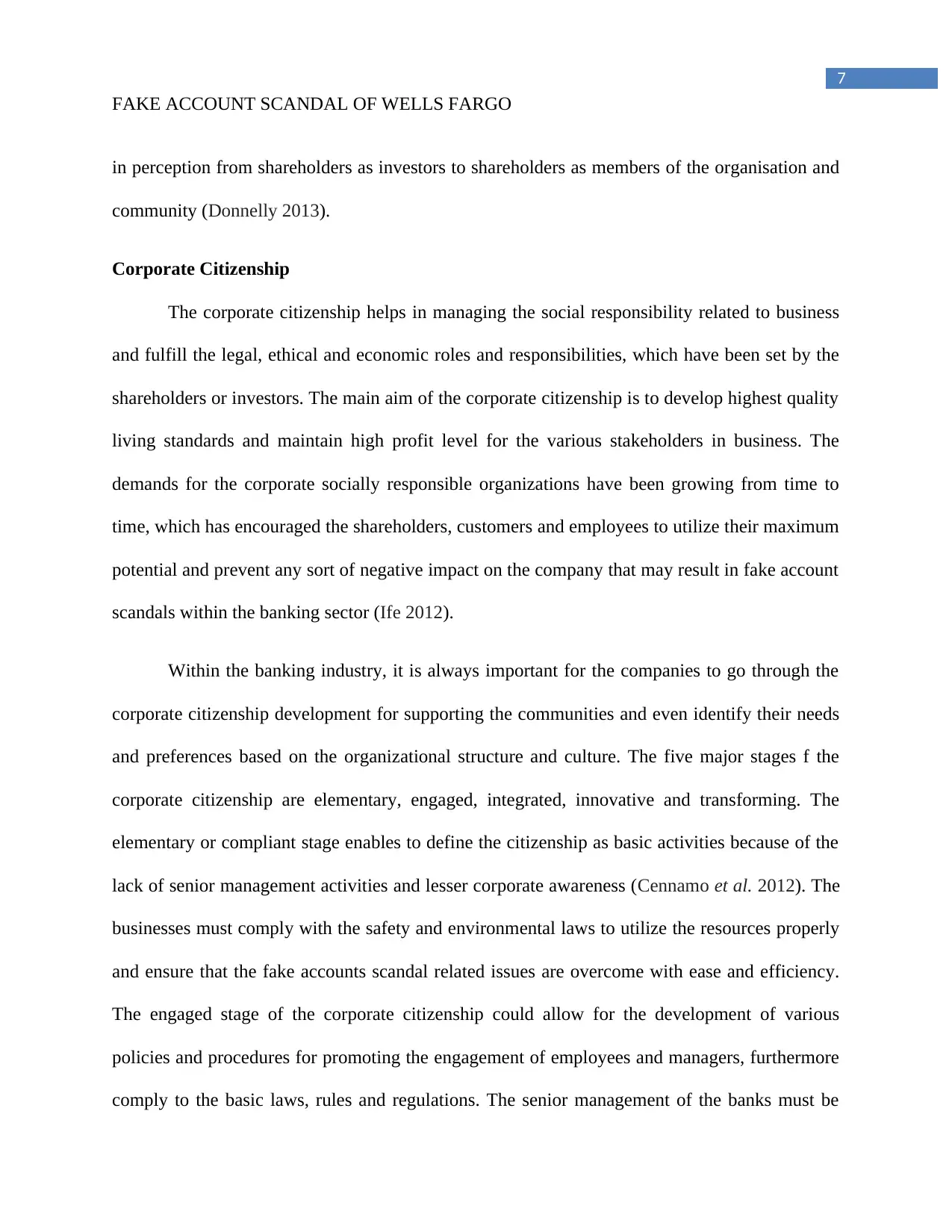
7
FAKE ACCOUNT SCANDAL OF WELLS FARGO
in perception from shareholders as investors to shareholders as members of the organisation and
community (Donnelly 2013).
Corporate Citizenship
The corporate citizenship helps in managing the social responsibility related to business
and fulfill the legal, ethical and economic roles and responsibilities, which have been set by the
shareholders or investors. The main aim of the corporate citizenship is to develop highest quality
living standards and maintain high profit level for the various stakeholders in business. The
demands for the corporate socially responsible organizations have been growing from time to
time, which has encouraged the shareholders, customers and employees to utilize their maximum
potential and prevent any sort of negative impact on the company that may result in fake account
scandals within the banking sector (Ife 2012).
Within the banking industry, it is always important for the companies to go through the
corporate citizenship development for supporting the communities and even identify their needs
and preferences based on the organizational structure and culture. The five major stages f the
corporate citizenship are elementary, engaged, integrated, innovative and transforming. The
elementary or compliant stage enables to define the citizenship as basic activities because of the
lack of senior management activities and lesser corporate awareness (Cennamo et al. 2012). The
businesses must comply with the safety and environmental laws to utilize the resources properly
and ensure that the fake accounts scandal related issues are overcome with ease and efficiency.
The engaged stage of the corporate citizenship could allow for the development of various
policies and procedures for promoting the engagement of employees and managers, furthermore
comply to the basic laws, rules and regulations. The senior management of the banks must be
FAKE ACCOUNT SCANDAL OF WELLS FARGO
in perception from shareholders as investors to shareholders as members of the organisation and
community (Donnelly 2013).
Corporate Citizenship
The corporate citizenship helps in managing the social responsibility related to business
and fulfill the legal, ethical and economic roles and responsibilities, which have been set by the
shareholders or investors. The main aim of the corporate citizenship is to develop highest quality
living standards and maintain high profit level for the various stakeholders in business. The
demands for the corporate socially responsible organizations have been growing from time to
time, which has encouraged the shareholders, customers and employees to utilize their maximum
potential and prevent any sort of negative impact on the company that may result in fake account
scandals within the banking sector (Ife 2012).
Within the banking industry, it is always important for the companies to go through the
corporate citizenship development for supporting the communities and even identify their needs
and preferences based on the organizational structure and culture. The five major stages f the
corporate citizenship are elementary, engaged, integrated, innovative and transforming. The
elementary or compliant stage enables to define the citizenship as basic activities because of the
lack of senior management activities and lesser corporate awareness (Cennamo et al. 2012). The
businesses must comply with the safety and environmental laws to utilize the resources properly
and ensure that the fake accounts scandal related issues are overcome with ease and efficiency.
The engaged stage of the corporate citizenship could allow for the development of various
policies and procedures for promoting the engagement of employees and managers, furthermore
comply to the basic laws, rules and regulations. The senior management of the banks must be
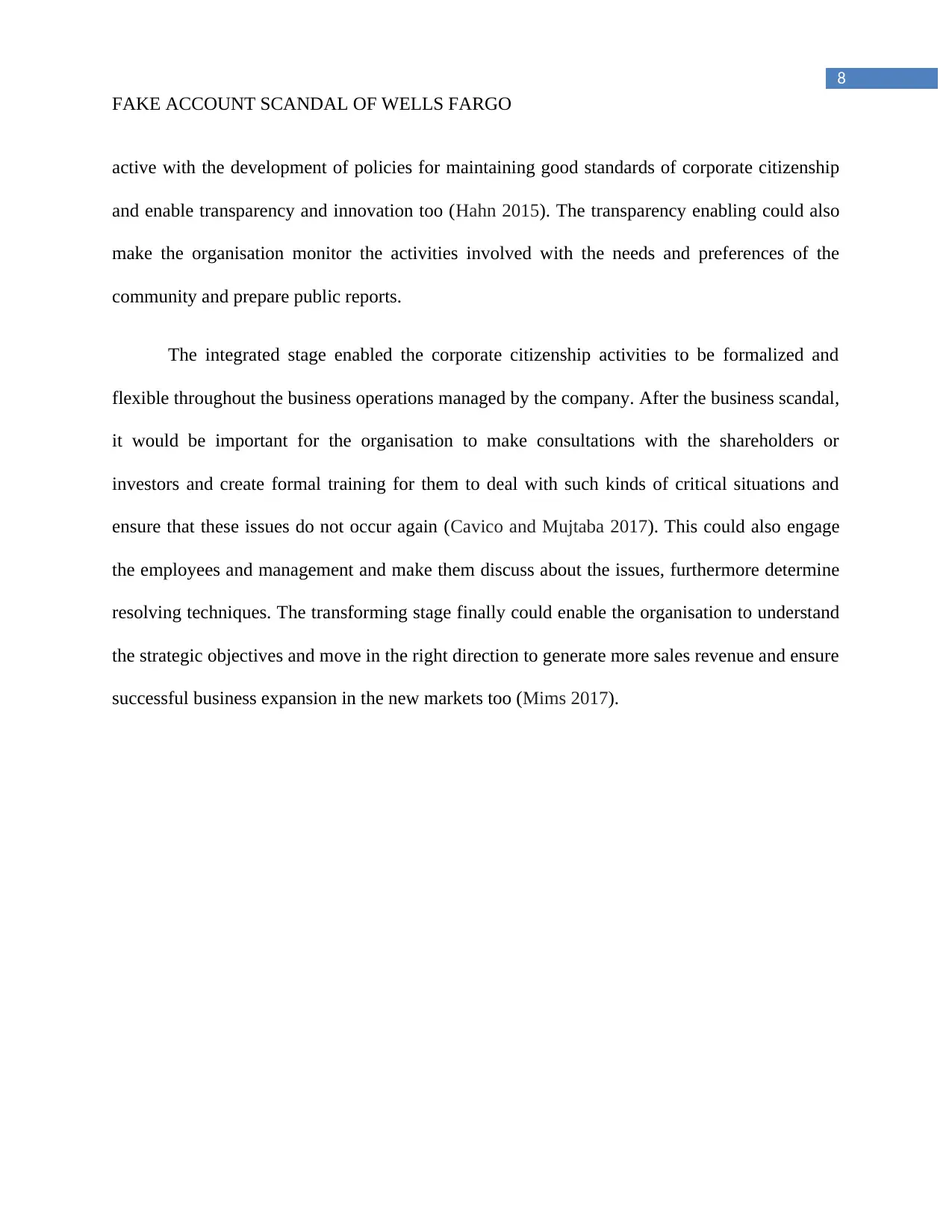
8
FAKE ACCOUNT SCANDAL OF WELLS FARGO
active with the development of policies for maintaining good standards of corporate citizenship
and enable transparency and innovation too (Hahn 2015). The transparency enabling could also
make the organisation monitor the activities involved with the needs and preferences of the
community and prepare public reports.
The integrated stage enabled the corporate citizenship activities to be formalized and
flexible throughout the business operations managed by the company. After the business scandal,
it would be important for the organisation to make consultations with the shareholders or
investors and create formal training for them to deal with such kinds of critical situations and
ensure that these issues do not occur again (Cavico and Mujtaba 2017). This could also engage
the employees and management and make them discuss about the issues, furthermore determine
resolving techniques. The transforming stage finally could enable the organisation to understand
the strategic objectives and move in the right direction to generate more sales revenue and ensure
successful business expansion in the new markets too (Mims 2017).
FAKE ACCOUNT SCANDAL OF WELLS FARGO
active with the development of policies for maintaining good standards of corporate citizenship
and enable transparency and innovation too (Hahn 2015). The transparency enabling could also
make the organisation monitor the activities involved with the needs and preferences of the
community and prepare public reports.
The integrated stage enabled the corporate citizenship activities to be formalized and
flexible throughout the business operations managed by the company. After the business scandal,
it would be important for the organisation to make consultations with the shareholders or
investors and create formal training for them to deal with such kinds of critical situations and
ensure that these issues do not occur again (Cavico and Mujtaba 2017). This could also engage
the employees and management and make them discuss about the issues, furthermore determine
resolving techniques. The transforming stage finally could enable the organisation to understand
the strategic objectives and move in the right direction to generate more sales revenue and ensure
successful business expansion in the new markets too (Mims 2017).
⊘ This is a preview!⊘
Do you want full access?
Subscribe today to unlock all pages.

Trusted by 1+ million students worldwide
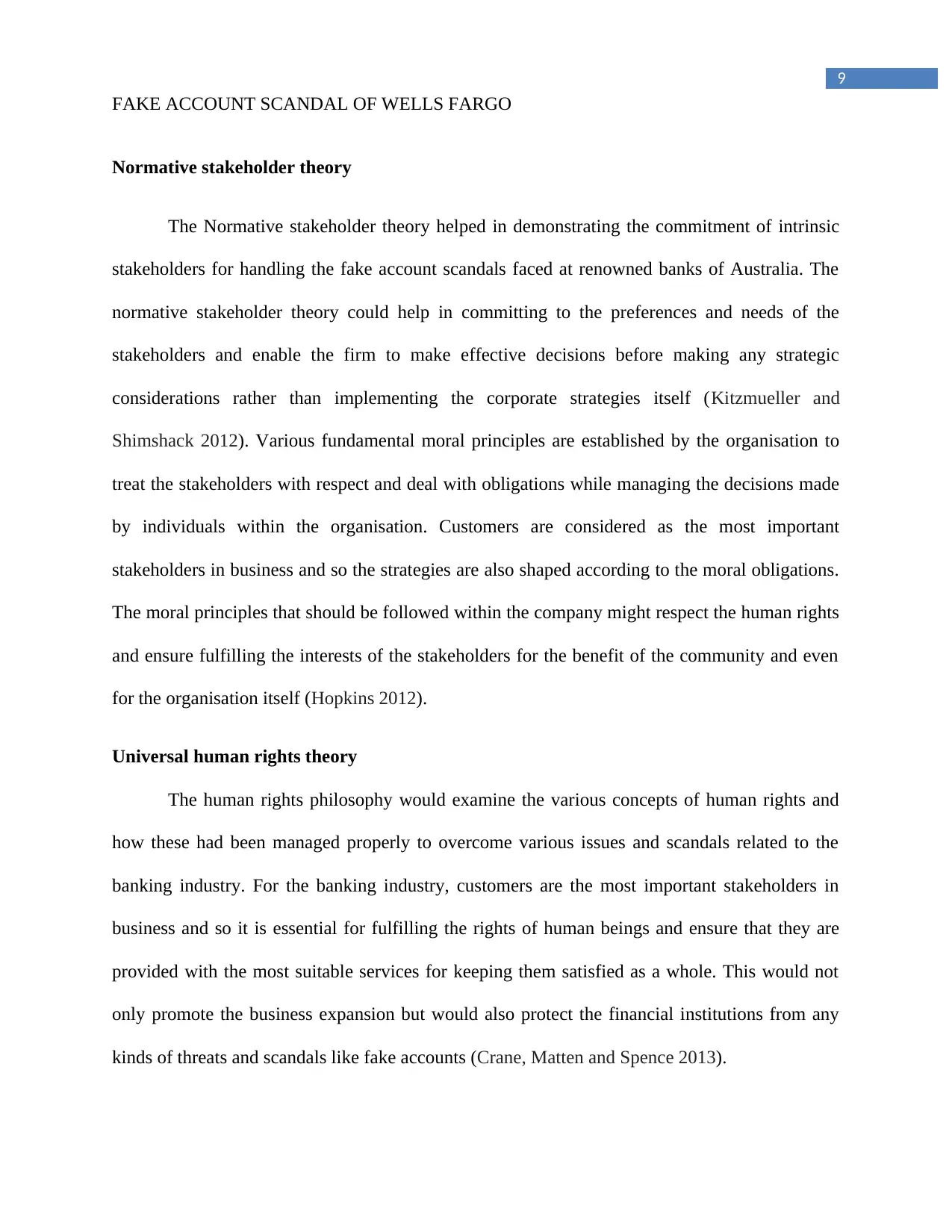
9
FAKE ACCOUNT SCANDAL OF WELLS FARGO
Normative stakeholder theory
The Normative stakeholder theory helped in demonstrating the commitment of intrinsic
stakeholders for handling the fake account scandals faced at renowned banks of Australia. The
normative stakeholder theory could help in committing to the preferences and needs of the
stakeholders and enable the firm to make effective decisions before making any strategic
considerations rather than implementing the corporate strategies itself (Kitzmueller and
Shimshack 2012). Various fundamental moral principles are established by the organisation to
treat the stakeholders with respect and deal with obligations while managing the decisions made
by individuals within the organisation. Customers are considered as the most important
stakeholders in business and so the strategies are also shaped according to the moral obligations.
The moral principles that should be followed within the company might respect the human rights
and ensure fulfilling the interests of the stakeholders for the benefit of the community and even
for the organisation itself (Hopkins 2012).
Universal human rights theory
The human rights philosophy would examine the various concepts of human rights and
how these had been managed properly to overcome various issues and scandals related to the
banking industry. For the banking industry, customers are the most important stakeholders in
business and so it is essential for fulfilling the rights of human beings and ensure that they are
provided with the most suitable services for keeping them satisfied as a whole. This would not
only promote the business expansion but would also protect the financial institutions from any
kinds of threats and scandals like fake accounts (Crane, Matten and Spence 2013).
FAKE ACCOUNT SCANDAL OF WELLS FARGO
Normative stakeholder theory
The Normative stakeholder theory helped in demonstrating the commitment of intrinsic
stakeholders for handling the fake account scandals faced at renowned banks of Australia. The
normative stakeholder theory could help in committing to the preferences and needs of the
stakeholders and enable the firm to make effective decisions before making any strategic
considerations rather than implementing the corporate strategies itself (Kitzmueller and
Shimshack 2012). Various fundamental moral principles are established by the organisation to
treat the stakeholders with respect and deal with obligations while managing the decisions made
by individuals within the organisation. Customers are considered as the most important
stakeholders in business and so the strategies are also shaped according to the moral obligations.
The moral principles that should be followed within the company might respect the human rights
and ensure fulfilling the interests of the stakeholders for the benefit of the community and even
for the organisation itself (Hopkins 2012).
Universal human rights theory
The human rights philosophy would examine the various concepts of human rights and
how these had been managed properly to overcome various issues and scandals related to the
banking industry. For the banking industry, customers are the most important stakeholders in
business and so it is essential for fulfilling the rights of human beings and ensure that they are
provided with the most suitable services for keeping them satisfied as a whole. This would not
only promote the business expansion but would also protect the financial institutions from any
kinds of threats and scandals like fake accounts (Crane, Matten and Spence 2013).
Paraphrase This Document
Need a fresh take? Get an instant paraphrase of this document with our AI Paraphraser
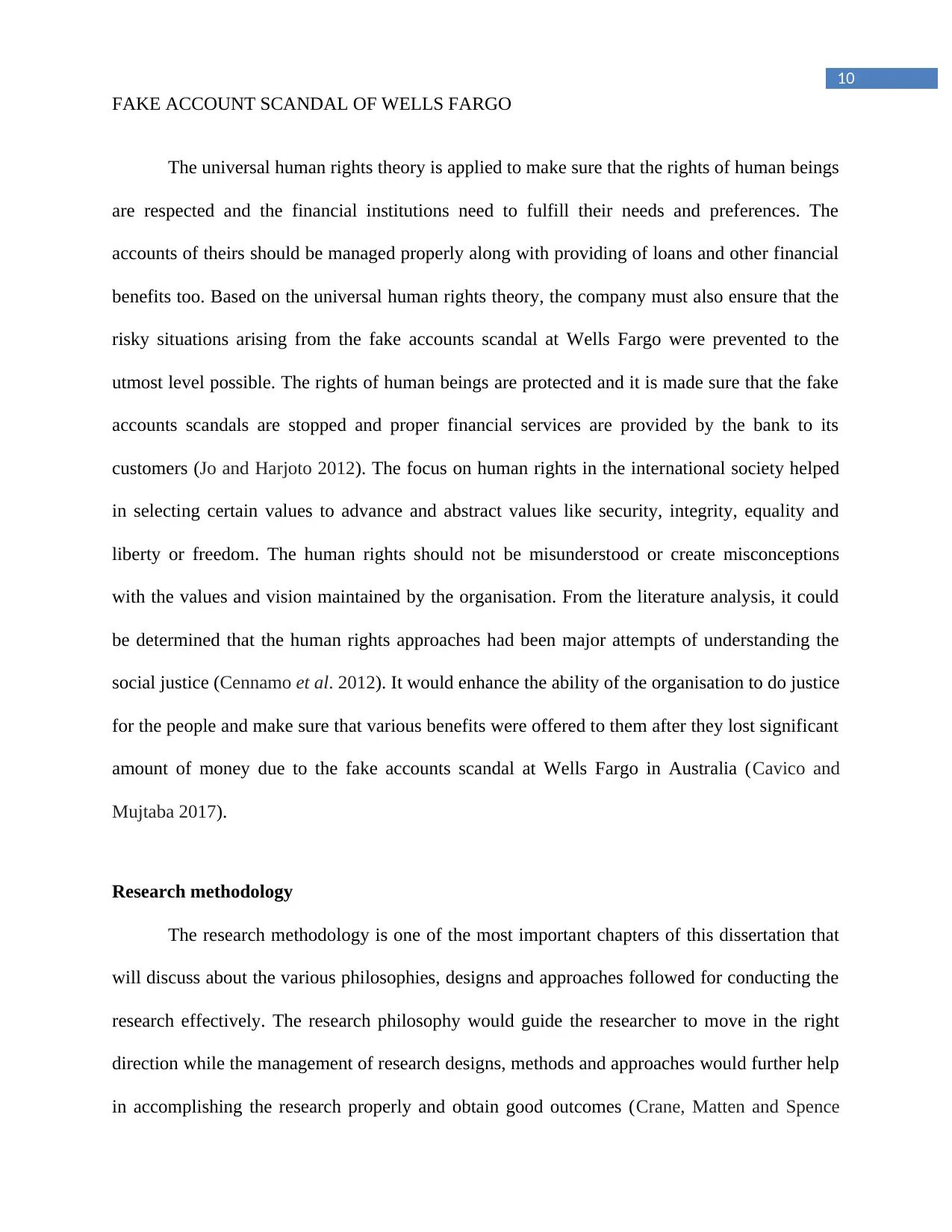
10
FAKE ACCOUNT SCANDAL OF WELLS FARGO
The universal human rights theory is applied to make sure that the rights of human beings
are respected and the financial institutions need to fulfill their needs and preferences. The
accounts of theirs should be managed properly along with providing of loans and other financial
benefits too. Based on the universal human rights theory, the company must also ensure that the
risky situations arising from the fake accounts scandal at Wells Fargo were prevented to the
utmost level possible. The rights of human beings are protected and it is made sure that the fake
accounts scandals are stopped and proper financial services are provided by the bank to its
customers (Jo and Harjoto 2012). The focus on human rights in the international society helped
in selecting certain values to advance and abstract values like security, integrity, equality and
liberty or freedom. The human rights should not be misunderstood or create misconceptions
with the values and vision maintained by the organisation. From the literature analysis, it could
be determined that the human rights approaches had been major attempts of understanding the
social justice (Cennamo et al. 2012). It would enhance the ability of the organisation to do justice
for the people and make sure that various benefits were offered to them after they lost significant
amount of money due to the fake accounts scandal at Wells Fargo in Australia (Cavico and
Mujtaba 2017).
Research methodology
The research methodology is one of the most important chapters of this dissertation that
will discuss about the various philosophies, designs and approaches followed for conducting the
research effectively. The research philosophy would guide the researcher to move in the right
direction while the management of research designs, methods and approaches would further help
in accomplishing the research properly and obtain good outcomes (Crane, Matten and Spence
FAKE ACCOUNT SCANDAL OF WELLS FARGO
The universal human rights theory is applied to make sure that the rights of human beings
are respected and the financial institutions need to fulfill their needs and preferences. The
accounts of theirs should be managed properly along with providing of loans and other financial
benefits too. Based on the universal human rights theory, the company must also ensure that the
risky situations arising from the fake accounts scandal at Wells Fargo were prevented to the
utmost level possible. The rights of human beings are protected and it is made sure that the fake
accounts scandals are stopped and proper financial services are provided by the bank to its
customers (Jo and Harjoto 2012). The focus on human rights in the international society helped
in selecting certain values to advance and abstract values like security, integrity, equality and
liberty or freedom. The human rights should not be misunderstood or create misconceptions
with the values and vision maintained by the organisation. From the literature analysis, it could
be determined that the human rights approaches had been major attempts of understanding the
social justice (Cennamo et al. 2012). It would enhance the ability of the organisation to do justice
for the people and make sure that various benefits were offered to them after they lost significant
amount of money due to the fake accounts scandal at Wells Fargo in Australia (Cavico and
Mujtaba 2017).
Research methodology
The research methodology is one of the most important chapters of this dissertation that
will discuss about the various philosophies, designs and approaches followed for conducting the
research effectively. The research philosophy would guide the researcher to move in the right
direction while the management of research designs, methods and approaches would further help
in accomplishing the research properly and obtain good outcomes (Crane, Matten and Spence
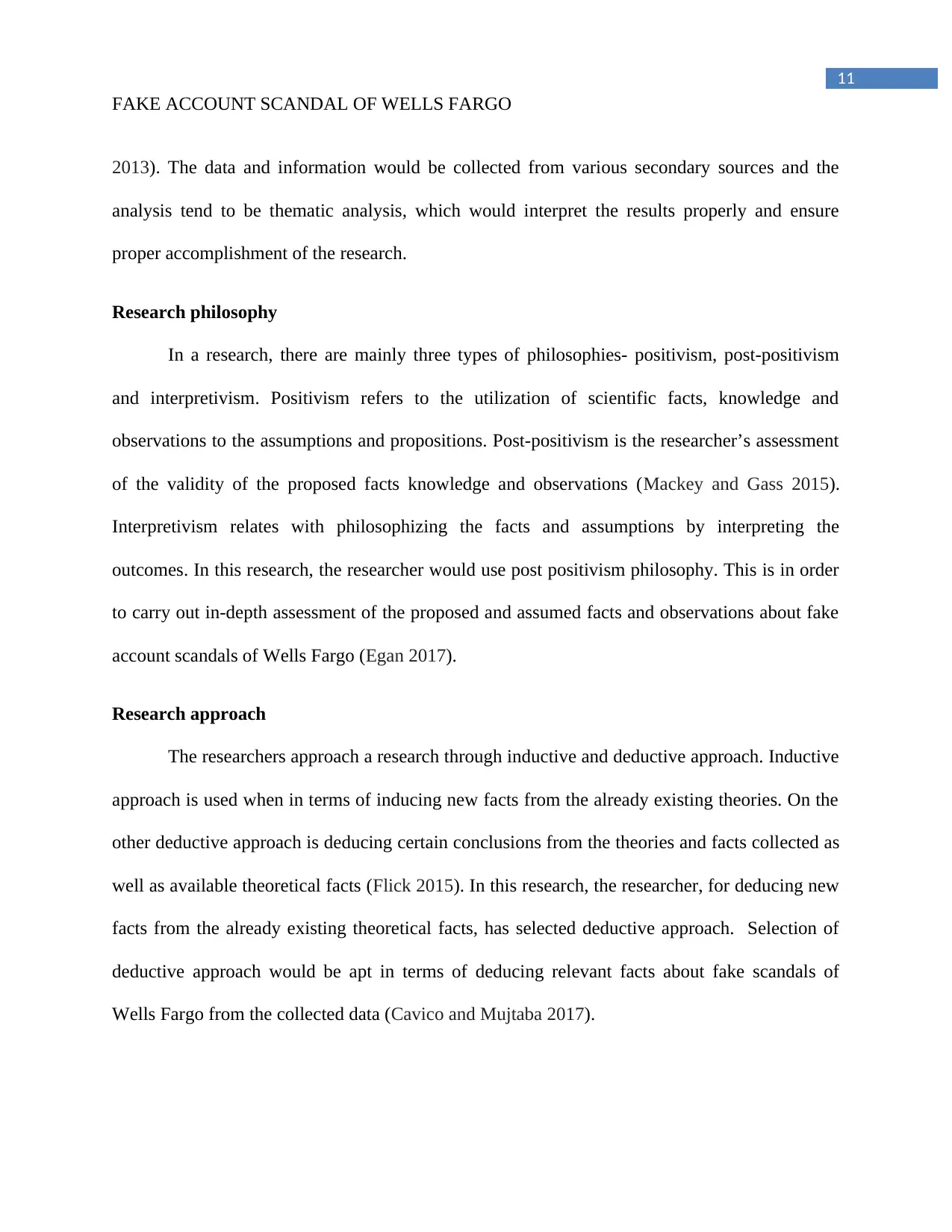
11
FAKE ACCOUNT SCANDAL OF WELLS FARGO
2013). The data and information would be collected from various secondary sources and the
analysis tend to be thematic analysis, which would interpret the results properly and ensure
proper accomplishment of the research.
Research philosophy
In a research, there are mainly three types of philosophies- positivism, post-positivism
and interpretivism. Positivism refers to the utilization of scientific facts, knowledge and
observations to the assumptions and propositions. Post-positivism is the researcher’s assessment
of the validity of the proposed facts knowledge and observations (Mackey and Gass 2015).
Interpretivism relates with philosophizing the facts and assumptions by interpreting the
outcomes. In this research, the researcher would use post positivism philosophy. This is in order
to carry out in-depth assessment of the proposed and assumed facts and observations about fake
account scandals of Wells Fargo (Egan 2017).
Research approach
The researchers approach a research through inductive and deductive approach. Inductive
approach is used when in terms of inducing new facts from the already existing theories. On the
other deductive approach is deducing certain conclusions from the theories and facts collected as
well as available theoretical facts (Flick 2015). In this research, the researcher, for deducing new
facts from the already existing theoretical facts, has selected deductive approach. Selection of
deductive approach would be apt in terms of deducing relevant facts about fake scandals of
Wells Fargo from the collected data (Cavico and Mujtaba 2017).
FAKE ACCOUNT SCANDAL OF WELLS FARGO
2013). The data and information would be collected from various secondary sources and the
analysis tend to be thematic analysis, which would interpret the results properly and ensure
proper accomplishment of the research.
Research philosophy
In a research, there are mainly three types of philosophies- positivism, post-positivism
and interpretivism. Positivism refers to the utilization of scientific facts, knowledge and
observations to the assumptions and propositions. Post-positivism is the researcher’s assessment
of the validity of the proposed facts knowledge and observations (Mackey and Gass 2015).
Interpretivism relates with philosophizing the facts and assumptions by interpreting the
outcomes. In this research, the researcher would use post positivism philosophy. This is in order
to carry out in-depth assessment of the proposed and assumed facts and observations about fake
account scandals of Wells Fargo (Egan 2017).
Research approach
The researchers approach a research through inductive and deductive approach. Inductive
approach is used when in terms of inducing new facts from the already existing theories. On the
other deductive approach is deducing certain conclusions from the theories and facts collected as
well as available theoretical facts (Flick 2015). In this research, the researcher, for deducing new
facts from the already existing theoretical facts, has selected deductive approach. Selection of
deductive approach would be apt in terms of deducing relevant facts about fake scandals of
Wells Fargo from the collected data (Cavico and Mujtaba 2017).
⊘ This is a preview!⊘
Do you want full access?
Subscribe today to unlock all pages.

Trusted by 1+ million students worldwide
1 out of 21
Related Documents
Your All-in-One AI-Powered Toolkit for Academic Success.
+13062052269
info@desklib.com
Available 24*7 on WhatsApp / Email
![[object Object]](/_next/static/media/star-bottom.7253800d.svg)
Unlock your academic potential
Copyright © 2020–2026 A2Z Services. All Rights Reserved. Developed and managed by ZUCOL.



